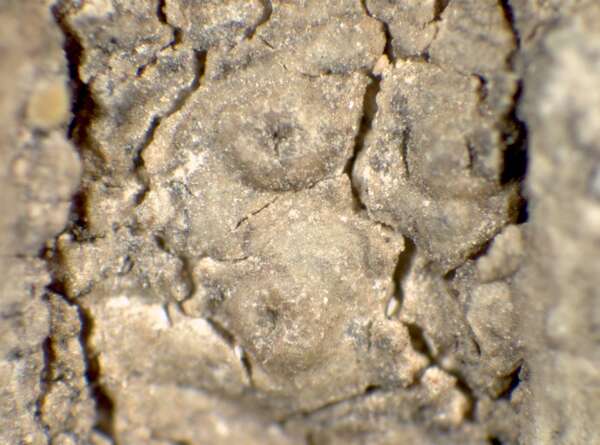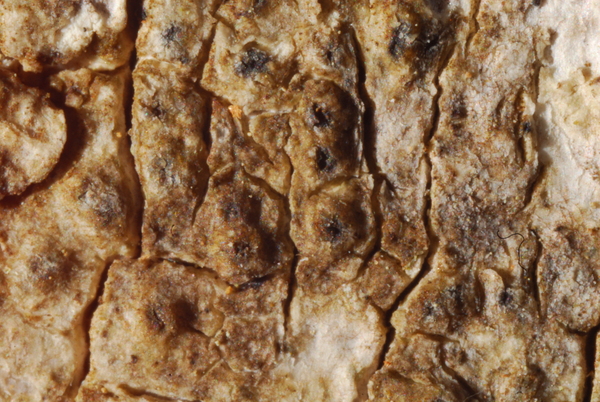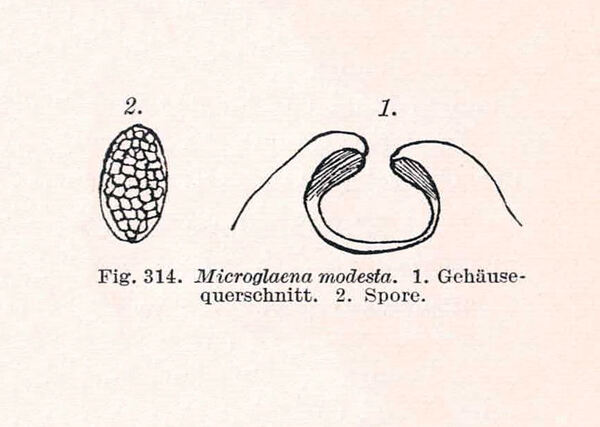Thelenella modesta (Nyl.) Nyl.
Mém. Soc. Sc. Nat. Cherbourg, 3: 193, 1855. Basionym: Verrucaria modesta Nyl. - Bot. Not.: 164, 1853.
Synonyms: Dactyloblastus wallrothianus (Körb.) A. Massal.; Luykenia modesta (Nyl.) Trevis.; Microglaena modesta (Nyl.) A.L. Sm.; Microglaena subcorallina Hasse; Microglaena wallrothiana Körb.; Microglaena wallrothiana var. septentrionalis Th. Fr.; Phlyctis norvegica Norman; Polyblastia modesta (Nyl.) H. Olivier; Thelenella wallrothiana (Körb.) Syd.; Verrucaria sericea var. wallrothiana (Körb.) Garov.
Description: Thallus crustose, episubstratic, thin and membranous to thick and uneven-warted, yellow-grey, greyish brown, or brownish. Perithecia 0.3-0.5 mm across, globose, discrete or more or less aggregated, three-quarters to fully immersed in prominent thalline warts. Exciple dark brown near the ostiole, brownish in upper part, pale or colourless in lower part; paraphysoids delicate, 1-1.5 μm thick, branched and/or anastomosing; hymenial gel I-, K/I-. Asci 4–8-spored, fissitunicate, with two functional wall-layers, the inner wall thin and the outer thick, with an ocular chamber, I-. Ascospores muriform, with 6-10 transverse septa and 2-3 longitudinal septa, hyaline to very pale brown at maturity, ellipsoid to ellipsoid-elongate, (20-)25-42 x (9-)11-17 μm, the outer wall scarcely thicker than the septa. Pycnidia black, Roccella-type. Conidia simple, hyaline, thread-like, 11-14 μm long. Photobiont chlorococcoid, the algal cells without a gelatinous sheath. Spot tests: K-, C-, KC-, P-, UV-. Chemistry: without lichen substances.
Growth form: Crustose
Substrata: bark
Photobiont: green algae other than Trentepohlia
Reproductive strategy: mainly sexual
Most common in areas with a humid-warm climate (e.g. most of Tyrrenian Italy)
Commonnes-rarity: (info)
Alpine belt: absent
Subalpine belt: absent
Montane belt: absent
Dry submediterranean belt: extremely rare
Humid submediterranean belt: very rare
Padanian area: absent
pH of the substrata:
1 2 3 4 5
Solar irradiation:
1 2 3 4 5
Aridity:
1 2 3 4 5
Eutrophication:
1 2 3 4 5
Poleotolerance:
0 1 2 3
Altitudinal distribution:
1 2 3 4 5 6
Rarity
absent
extremely rare
very rare
rare
rather rare
rather common
common
very common
extremely common
Loading data...
Occurrence data
Predictive map
Growth form: Crustose
Substrata: bark
Photobiont: green algae other than Trentepohlia
Reproductive strategy: mainly sexual
Most common in areas with a humid-warm climate (e.g. most of Tyrrenian Italy)
Commonnes-rarity: (info)
Alpine belt: absent
Subalpine belt: absent
Montane belt: absent
Dry submediterranean belt: extremely rare
Humid submediterranean belt: very rare
Padanian area: absent
pH of the substrata:
| 1 | 2 | 3 | 4 | 5 |
Solar irradiation:
| 1 | 2 | 3 | 4 | 5 |
Aridity:
| 1 | 2 | 3 | 4 | 5 |
Eutrophication:
| 1 | 2 | 3 | 4 | 5 |
Poleotolerance:
| 0 | 1 | 2 | 3 |
Altitudinal distribution:
| 1 | 2 | 3 | 4 | 5 | 6 |
Rarity
absent
extremely rare
very rare
rare
rather rare
rather common
common
very common
extremely common
Loading data...
Occurrence data
Predictive map









